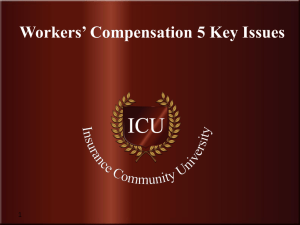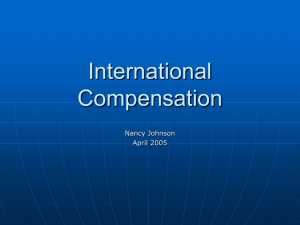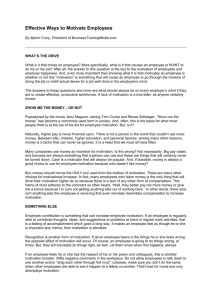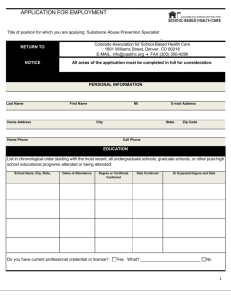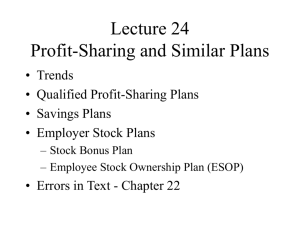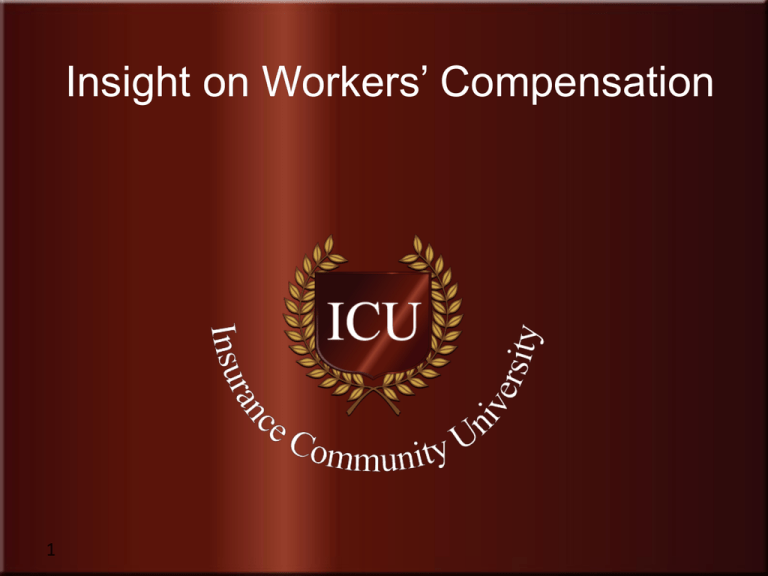
Insight on Workers’ Compensation
1
Insurance Community University
Disclaimer
Insurance forms and endorsements vary based on insurance
company; changes in edition dates; regulations; court decisions;
and state jurisdiction. This instructional materials provided by
Insight is intended as a general guideline and any interpretations
provided by Insight do not modify or revise insurance policy
language. The authors of these materials, Insight Insurance
Consultants is a division of Insight Consulting and Management
Inc. In providing these materials, Insight assumes neither liability
nor responsibility to any person or business with respect to any
loss that is alleged to be caused directly or indirectly as a result
of the instructional materials provided.
Copyright 2010 – 2011 All Rights Reserved
www.insurancecommunitycenter.com
Laurie: 714.803.5830 laurie@insurancecommunitycenter.com
Marjorie: 714.206.9583
Marjorie@insurancecommunitycenter.com
Insurance Community University
2
Your Instructor Today
Casey Roberts, ACSR, AFIS, CIC
Laurus Insurance Consulting
707.477.0913
Casey@laurusinsuranceconsulting.com
www.laurusinsuranceconsulting.com
Insurance Community University
3
Objectives
• Independent contractors, leased and
temporary employees
• Locations: employer, work sites, hire,
residency
• Third party action over claims and
coverage
• Government contracts
• Foreign Workers’ Compensation
Insurance Community University
4
Workers’ Compensation Overview
Required coverage
Often straightforward
Unique exposures must
be addressed
Insurance Community University
5
Workers’ Compensation Overview
Most states are
compulsory
Covers employees
• Full or part time
• Lawfully
employed or not
• Texas is elective
• Employers
subject to the
law must provide
benefits
according to the
statute
Insurance Community University
6
Monopolistic States
Must purchase statutory coverage
through state
• Cannot extend policies in other states
• North Dakota, Ohio, Washington, Wyoming
and Puerto Rico, U.S. Virgin Islands
• Add Stop-Gap coverage according to state
requirements
• WC policy or CGL
• Include as underlyer on Umbrella/Excess
Insurance Community University
7
Leased, Temporary Employees
and Independent Contractors
Insurance Community University
8
The Act
Leased
employees
• State statutes vary on
requirements for PEO
and Client to insure
Temporary
employees
• Temp company is direct
(general) employer
• Client can be deemed
special employer
Obtain evidence
of coverage
Insurance Community University
• Often overlooked
9
Employee v. Independent
Contractor
Avoidance of WC
Innocent misclassification
Penalties can be severe
Insurance Community University
10
Employee Definition
• An employee is a (natural) person who
works in the service of another person
under an express or implied contract of
hire, under which the employer has the
right to control the details of work
performance
– Black's Law Dictionary
Insurance Community University
11
IC Definition
• A person or organization hired to
perform services under an express or
implied contract
– NOT subject to hiring party’s control or
manner and means of performing the
services
Insurance Community University
12
IRS Guidelines for IC Status
Previously used
a 20-point test
• Changed in 2010
Now uses three
broad areas of
criteria
Insurance Community University
13
IRS Guidelines for IC (Hired Party)
Behavior control
What when and how work is performed
Financial control
How and when payment is
made
Makes their own
profit/loss
Relationship to hiring party
Contract
Benefits
Insurance Community University
Definite time
period for work
14
Worker’s Compensation Control
IC provides
evidence of
current WC
coverage
If sole
proprietor,
include
statement
regarding WC
status in
contract
Insurance Community University
15
Locations: Employer, Work Sites,
Hire, Residency
Insurance Community University
16
Multi-state Exposures
Benefits typically follow employees
temporarily working in other states
or countries
A state can allow benefits to apply
to non-residents
Insurance Community University
17
Multi-state Exposures
Employees can often select state
from which to receive benefits
State of
hire
State of
residence
State of
pay
Insurance Community University
State of
injury
18
Part 3A – Workers’ Compensation
• List all states in which insured has
operations known or expected
• If the exposure is known or expected, it
is intended that such state should be
listed on the information page
• Activates Compensation Laws for those
states
Insurance Community University
19
Part 3C – Other States Insurance
• Allows state benefits to apply in all
states allowed by law and not named in
3A
– Intended only for the unexpected
exposure.
• Work in progress as of inception date
will NOT be covered under 3C – MUST
be listed in 3A
Insurance Community University
20
Part 3C – Other States Insurance
• Use broad language under 3C
“All states except monopolistic states and
states designated in 3A.”
• Without this language – domicile state
benefits apply
– May be lower than state of injury
– Employer will be liable for the difference
– Coverage through State Compensation
funds extend state benefits only
Insurance Community University
21
Coverage Examples
Insurance Community University
22
Employee Hired in State #1
Works in State #2
State #1 Listed in WC Policy 3A
#2 Listed in 3A
Either state
benefits
apply
#2 Not Listed in 3A / Other
States Language in 3C
Work started
after inception
Insurance Community University
Either state
benefits
apply
23
Employee Hired State #1
#1 Listed in 3A / #2 Not Listed in 3A
3C Other States Language Not Included
Job started in #2 after inception
Employee may file in #1 or #2 and receive
benefits allowed in that state
Policy pays benefits from #1
If less than those in #2 – the employer will
pay the difference
Insurance Community University
24
State #2 Not Listed in WC Policy 3A
Other States Language Irrelevant
Employee Hired in
#2 Before Inception
Job In Progress at
Inception
Employee injured in #2
No coverage
Insurance Community University
25
Third Party Action Over Claims
And Coverage
Insurance Community University
26
Third party over or Action-Over
Indemnity
Employee has
claim against
3rd party
Third party
tries to recover
all or part of
the claim from
the employer
under
indemnity or
legal theory
Insurance Community University
27
Example
Employee injured while operating a
table saw and sues the saw
manufacturer
The manufacturer sues the
employer claiming employer was
negligent in training and
supervision and not product liability
Insurance Community University
28
Example
Injured Sub-contractor employee sues General
Contractor for failure to maintain safe premises
GC files cross-complaint against Sub for failure
to provide proper supervision
• If Sub agreed to indemnify by contract – coverage
applies under CGL
• No contract – coverage applies under Employer’s
Liability
Insurance Community University
29
Government Contracts
Insurance Community University
30
Government Contracts
Many companies are entering into business
relationships with the US Government
Some of those
contracts
involve
projects in
other countries
• Defense Base Act
coverage is
mandatory
Insurance Community University
31
Defense Base Act Background
• Passed by US Congress in 1941
• Primary goal
– Cover workers on military bases outside the
United States
• Today, after several amendments now
includes all public works contracts
– Any military installation outside the US
– Anywhere outside the US
Insurance Community University
32
Defense Base Act Background
• DBA coverage required for any
employee, regardless of their nationality
or home country
• Local nationals or third country
nationals are covered under the DBA
Insurance Community University
33
Defense Base Act Overview
• Penalties for failure to provide DBA are severe
• Failure to procure DBA coverage exposes
employers to penalties
– Employers are subject to common law suits
– No coverage applies
– No common law defenses
– No need to prove negligence
– Claimants or their heirs need only file suit and do
not have to prove negligence
– Suits are brought in Federal Court
Insurance Community University
34
DBA Doctrines
• The Zone of Special Danger doctrine
– Employee’s injury or death arises out of or
in the course of employment
– The injury takes place in a location where
circumstances of employment place the
employee in a zone of danger
– Injury need to be strictly related to specific
job duties
Insurance Community University
35
DBA Doctrines
• The Reasonable Recreation doctrine
– Employee’s injury arises out of or in the
course of the employer’s furnished, funded
or promoted recreational activities
– Includes some non-sponsored activities
Insurance Community University
36
Coverage
•
•
•
•
•
•
Full medical care
Weekly benefits - % of salary
Re-employment, when possible
Education benefits
Scheduled benefits
Lifetime benefits for lost earnings or
earning capacity on non-scheduled
injuries
Insurance Community University
37
Coverage
• A D & D coverage
– 24/7 most employees
– $50,000 U.S. nationals
– $25,000 third country nationals
– $2,500 local nationals
– Some insurers will increase
Insurance Community University
38
Who Writes DBA
• Long list of authorized insurers
• Majority written through
– Ace Marine
– Chartis
– CNA
Insurance Community University
39
Foreign Workers’ Compensation
Insurance Community University
40
Foreign Voluntary Workers’
Compensation
• “Standard” WC coverage extends to
extra-territorial workers
• May be inadequate to coverage
additional risk
– Disease
– Foreign nationals
– Repatriation
• FVWC provides additional coverage
Insurance Community University
41
Foreign Voluntary Workers’
Compensation
Policy usually specifies the
jurisdictional law that will apply
Typically includes
repatriation costs and
endemic disease
Covers U.S. employees
while abroad on work,
temporarily or
permanently
Insurance Community University
42
Foreign Voluntary Workers’
Compensation Coverage
Covered repatriation
expenses
Covered endemic
disease expenses
• Costs to return
employee to the US
for medical
treatment
• Return of
employee’s body
for funeral
• Medical costs due
to disease that is
endemic to that
country
Insurance Community University
43
Standardized Solutions
• Foreign Coverage Endorsement, WC 48
06 03 11 87
– Covers a person hired in the U. S. Working
temporarily in a foreign country
– Covers BI by accident or disease, including
any endemic disease
– War, invasion, and hostilities-caused
injuries not covered
Insurance Community University
44
Standardized Solutions
• Form WC 48 06 03 22 87
– Lists the employees to be covered and
which state's benefits are to apply to them
– Pays the benefits for the listed state to an
employee injured in a foreign country
Insurance Community University
45
Standardized Solutions
• Excess Repatriation Expenses, Form WC
48 06 03
– Covers the difference between transporting
a person under medical care and the
normal expenses to have the person travel
back to the U.S.
Insurance Community University
46
Policy Provisions
• Extend coverage to include “Travel Assistance”
– employees and dependents
• Include coverage for “foreign nationals”
– working for the insured
– working outside their country of origin
• Include Employers Liability
– some jurisdictions require this coverage is placed
locally
Insurance Community University
47
Foreign Admitted WC
• Many countries require compulsory WC
coverage
– FVWC does not substitute
• Admitted v. Non-admitted
– Check with international underwriting desk
to determine which is required by each
country of exposure
• Can be written stand-alone or with an
international package policy
Insurance Community University
48
Summary
• Although the majority of your clients
will need standard solutions, some will
need extra attention
• These situations can occur with small,
medium or large accounts
– Always ask your client about their business
objectives and risks for the upcoming year
Insurance Community University
49


